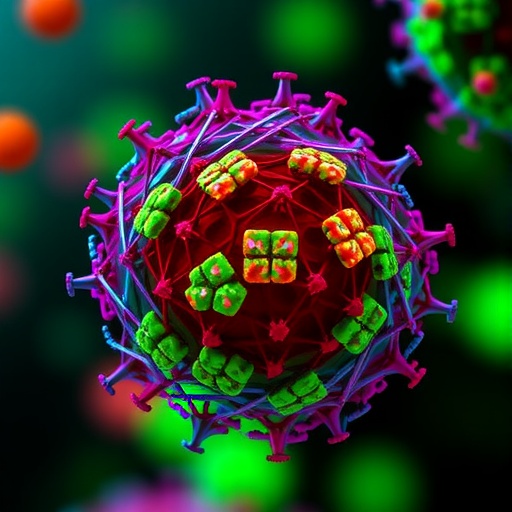In the relentless battle against colorectal cancer, a major challenge lies in overcoming resistance to chemotherapy drugs that are the cornerstone of treatment. Fluorouracil, commonly known as 5-fluorouracil or 5-FU, has been a staple chemotherapeutic agent used worldwide, especially against colorectal cancer. However, tumor cells frequently develop resistance to 5-FU, leading to treatment failure and disease progression. In a groundbreaking study recently published in Medical Oncology, researchers have illuminated the complex genetic and transcriptomic changes that fuel the aggressive behavior of 5-FU-resistant colorectal cancer cells, opening new avenues for targeted therapies and precision medicine.
The study focused on HCT116 cells, a well-established human colorectal cancer cell line widely used in cancer research. By comparing regular HCT116 cells with their 5-FU-resistant counterparts, the researchers conducted a comprehensive analysis integrating whole-genome sequencing and transcriptome profiling. This dual approach allowed them to uncover mutations, gene expression shifts, and pathway alterations that collectively confer enhanced aggressiveness to resistant cells.
Chemotherapy resistance is not simply a matter of one or two gene mutations but involves a multifaceted rewiring of cellular networks. The researchers identified significant genetic alterations across key oncogenes and tumor suppressor genes within 5-FU-resistant HCT116 cells. Notably, mutations were detected in genes that regulate DNA repair mechanisms, apoptosis, and cell cycle control. These changes contribute to the cells’ ability to evade drug-induced damage and sustain uncontrolled proliferation despite therapeutic pressure.
Simultaneously, transcriptomic profiling revealed dramatic shifts in gene expression patterns, indicating that the resistant cells undergo profound phenotypic changes at the RNA level. Genes involved in epithelial-to-mesenchymal transition (EMT), a process linked to metastasis and invasion, were upregulated. This transition endows cancer cells with enhanced motility and invasive capabilities. The data pinpointed key EMT markers elevated in resistant cells, correlating with their heightened aggressiveness observed in functional assays.
Beyond EMT, transcriptomic data showed dysregulation of multiple signaling pathways implicated in survival and drug resistance, such as the PI3K/AKT/mTOR axis and Wnt/β-catenin pathway. Such pathways are notorious for driving cancer progression and promoting a stem-like state in tumor cells, which may underlie the notorious difficulty in eradicating chemotherapy-resistant cancer populations. The amplified activity of these pathways could represent vulnerabilities for therapeutic exploitation.
Furthermore, the study shed light on changes in the tumor microenvironment modulation by resistant cells. Genes coding for secreted factors, cytokines, and extracellular matrix components were differentially expressed, suggesting that resistant cells may remodel their surroundings to create a more permissive niche for growth and dissemination. This microenvironmental conditioning could further exacerbate disease aggressiveness and resistance to treatment.
The researchers also explored metabolic adaptations, noting that resistant HCT116 cells reprogram their metabolism to sustain survival under chemotherapeutic stress. Upregulation of glycolytic enzymes and alterations in mitochondrial function were observed, aligning with a metabolic shift that supports rapid proliferation and resilience in the face of 5-FU toxicity. These findings align with the growing recognition that metabolic plasticity is a hallmark of aggressive cancer phenotypes.
Importantly, the integration of genetic and transcriptomic data enabled the identification of candidate biomarkers that could predict resistance and disease progression. Such markers not only have prognostic potential but may guide the development of combination therapies designed to prevent or overcome chemoresistance. This could mark a significant leap toward personalized treatment strategies improving patient outcomes.
The use of cutting-edge sequencing technologies paired with robust bioinformatics pipelines highlights the power of multi-omics approaches in unraveling the complexity of cancer biology. By dissecting both the static genetic blueprint and dynamic gene expression changes, this study provides a holistic view of resistance mechanisms that single-layer analyses might miss.
Given the global burden of colorectal cancer, particularly due to its high incidence and mortality rates associated with chemoresistant disease, these insights are timely and crucial. Understanding the molecular underpinnings of resistance can inform the design of next-generation therapeutics and clinical trials aimed at enhancing the efficacy of existing chemotherapy regimens.
While the study’s focus on in vitro cell lines may raise questions about translational relevance, the findings lay essential groundwork for further validation in animal models and patient-derived samples. Future research will need to confirm whether the identified alterations consistently appear in clinical resistant tumors and contribute causally to therapy failure.
The detailed characterization of 5-FU-resistant HCT116 cells also underscores the heterogeneity of colorectal cancer and the necessity to tailor treatments to evolving tumor landscapes. Resistance emerges not from a singular cause but from a confluence of genetic, transcriptomic, and metabolic shifts—each offering a therapeutic target.
In conclusion, this research advances our understanding of how colorectal cancer cells adapt and thrive despite 5-FU chemotherapy. By revealing the genetic and transcriptomic changes underlying enhanced aggressiveness in resistant cells, the study paves the way for innovative interventions aimed at dismantling the defenses of drug-resistant cancer. As researchers worldwide build upon these findings, hope grows for more effective strategies to combat the formidable challenge of chemotherapy resistance in colorectal cancer.
Subject of Research: Genetic and transcriptomic changes in 5-fluorouracil-resistant colorectal cancer cells.
Article Title: Genetic and transcriptomic alterations underlying aggressiveness in 5-fluorouracil-resistant HCT116 cells.
Article References:
Sooksaen, P., Thim-uam, A., Praphasawat, R. et al. Genetic and transcriptomic alterations underlying aggressiveness in 5-fluorouracil-resistant HCT116 cells. Med Oncol 42, 512 (2025). https://doi.org/10.1007/s12032-025-03078-5
Image Credits: AI Generated
Tags: 5-FU resistance mechanismscancer cell aggressiveness factorschemotherapy resistance in cancer treatmentcolorectal cancer treatment challengesgenetic alterations in colorectal cancerHCT116 cell line researchmolecular pathways in cancer resistanceoncogenes and tumor suppressor genesprecision medicine in oncologytargeted therapies for colorectal cancertranscriptomic changes in cancer cellswhole-genome sequencing in cancer studies





